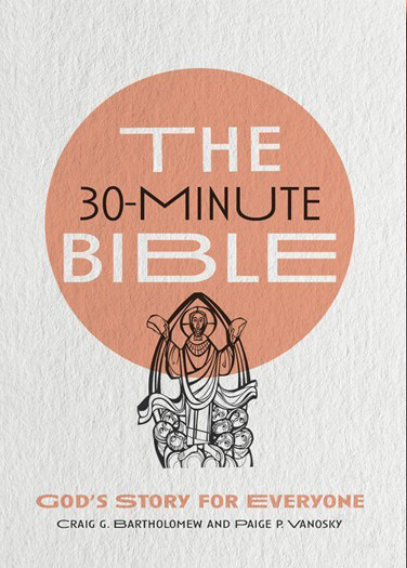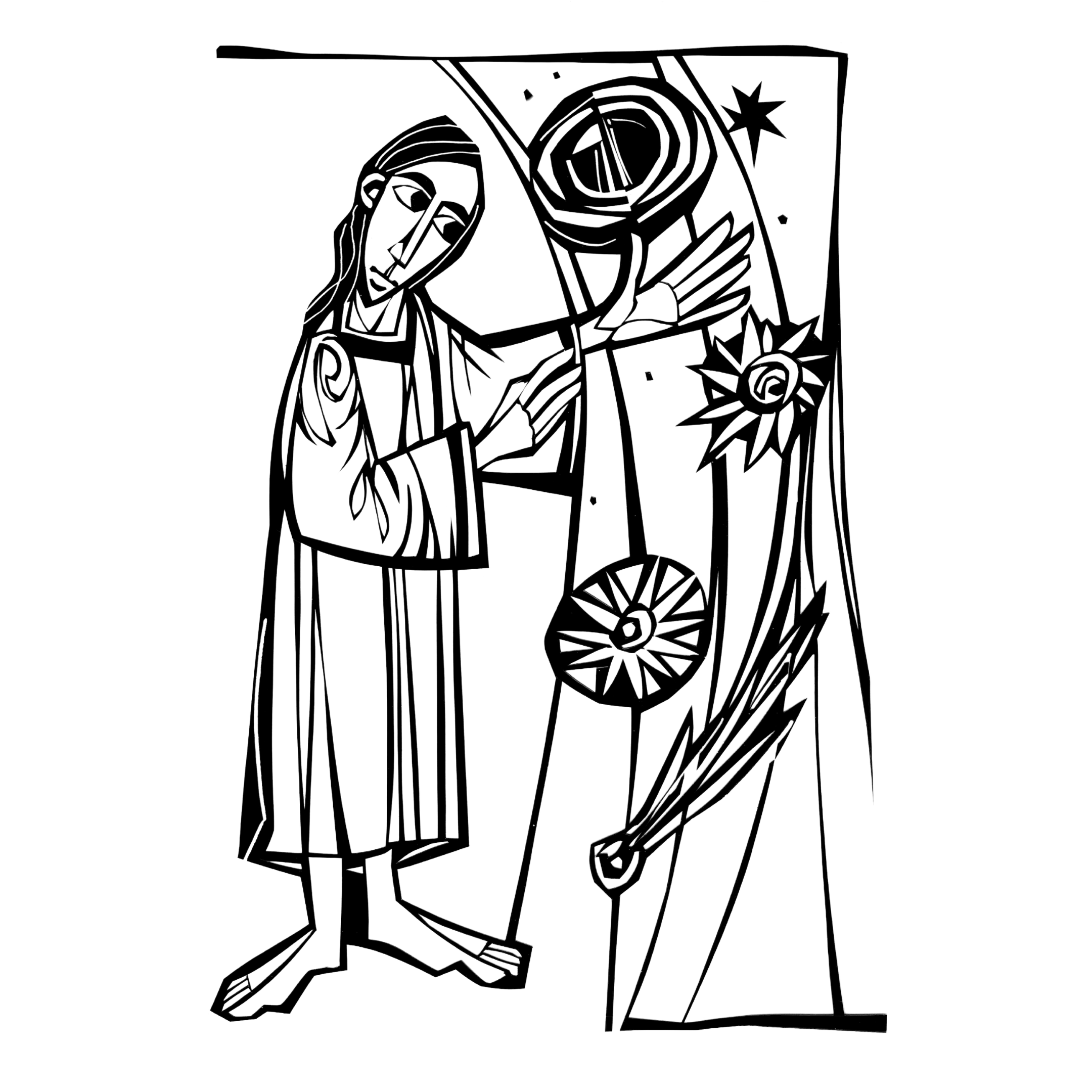
Preview the Power of The 30-Minute Bible
The story of creation sets the stage for understanding God, our lives, and our world. It is also the foundational story for understanding the Bible.
Readers will find that each chapter of the book provides a brief background for understanding and linking together key biblical stories. To maximize understanding, we recommend reading the accompanying story in the Bible, then reviewing or discussing the downloadale reading questions, taking about 30 minutes per chapter. Enjoy!

Chapter 2: Creation
Excerpt from The 30-Minute Bible by Craig G. Bartholomew and Paige P. Vanosky Taken from Chapter Two, “Creation”
ONCE I (PAIGE) WAS DRIVING through a particularly beautiful mountain range, enjoying the majestic scenery and listening to one of my favorite singers, Louis Armstrong. He was singing, “I see trees so green, red roses too, I see them bloom for me and you.” Just as I crested the mountaintop and was able to see a vista of extraordinary beauty stretching to the horizons, the chorus of the song came on, “And I think to myself, ‘What a wonderful world.’” It was a show-stopping moment. Perhaps you have had a similar experience while watching a majestic sunrise or sunset in a magical setting, or when you’ve found yourself surrounded by the awakening beauty of spring. It is hard to experience such beauty and not reflect on where it has come from.
The Bible’s answer is found in Genesis 1—it all comes from God, the Creator. Of course, in our modern world people have many questions about this, questions like, Can we really still believe in God as Creator today? How does creation relate to science and evolution? These are important questions, but it is just as important to remember that the authors of the Bible were not thinking about such questions as they wrote. Therefore, when it comes to creation we need first to listen to the Bible on its own terms before asking how its message relates to our questions today.
The biblical story takes us way back through the mists of time to “in the beginning.” The cosmos and our world have not always existed; there was a “beginning” when the entire cosmos was brought into existence or created by God. It is appropriate, then, that the Bible, the story of our world, begins with these words: “In the beginning God created the heavens and the earth.”
“The heavens and the earth” is a way of saying “absolutely everything!” If, for example, you wanted to refer to the whole of a person, you might say, “She is wonderful from the tips of her toes to the hair on her head,” meaning that you love everything about her. The opening verse of the Bible does the same thing: from the earth all the way to the heavens, every single thing is made by God.
It is worth pausing to let the enormity of this sink in. Craig grew up in South Africa, and when he returns to his homeland, it is not uncommon to find stickers on items saying, “Made in South Africa.” So too, in America we find stickers saying, “Made in America.” From the Bible’s perspective, every single thing in creation would have to have a sticker on it saying, “Made by God”: kingfishers and worms, rainbows and sunsets, individuals and nations, human capacities to think, run, jump, dance, enjoy sex, and more. For those who sometimes think that faith in God is just about being spiritual and has little to do with the material aspects of our world, we see in the very first chapter in the Bible that nothing could be further from the truth.
Genesis 1 tells about God’s creation of light and time, of the sky, the oceans, and the earth. God sets up the sun and the moon and the stars in the sky, thereby introducing seasons into our life on earth. Once the three major places on earth are established—the earth, the sky, the seas—God provides inhabitants for each of them: sea creatures for the oceans; birds for the sky; and plants, animals, and humans for the land. At every point of his creative work God contemplates it and declares it “good,” and when he has finished creating the world, he declares it “very good.” It is an astonishing vision of all of life— with all its diversity and wonder—as God’s creation.
The poet Gerard Manley Hopkins speaks of the world as “charged with the grandeur of God,” an expression that captures what it means for the world to be “very good.” Through television programs like Blue Planet, we are becoming aware of the immense variety of sea creatures, all made by God. For those of us who are gardeners or farmers, the wonderful variety of plants and flowers comes from God. For those of us who enjoy gazing at the stars and the planets, all are from God. The Bible opens with the whole of the world in view and declares that it all originates from God.
If, like us, you love art, Genesis 1 is like being taken to the most extraordinary exhibition you have ever seen. But imagine if, even as you are exploring the exhibition with wide eyes, a friend comes up to you and asks, “Would you like to meet the artist?” Of course, your answer would be, “Yes.” This is exactly what the Bible does in its opening chapters. Yes, the creation is wonderful, but even more wonderful is the One who made it, and a major aim of the Bible is to introduce us to the Creator God. What is the Creator like? The opening words begin to provide our answer.
As the Creator, God is, first, royalty par excellence. He is the great King. In the world in which the Old Testament—the first part of the Bible—was written, kings were often thought of as gods and wielded great power. But God’s kingship exceeds all earthly kings. A king’s word might be a command, but God simply says, “Let there be . . .” and that part of creation is ushered into existence. God is all powerful.
Second, some people have a spaceman view of God—he is there but distant and uninvolved in our world. On the contrary, this chapter reveals a God who speaks and sees and ponders his handiwork. Like any good craftsperson, he is deeply interested in what he has made.
Third, God is one; he is the one and only God. In the world in which the Old Testament was written, the nations believed in thousands of different gods, and they had all sorts of stories about them and temples for their worship. The early readers of Genesis 1 would have noticed that when two of these “gods,” the sun and the moon, are created (see Genesis 1:14-19), the Bible deliberately avoids using the words “sun” and “moon,” referring to them instead as “the greater light” (the sun) and “the lesser light” (the moon). Why? To make it quite clear that they are not gods but part of God’s creation with a specific function in his universe. God is the one and only God.
Fourth, God is wonderfully loving and kind. A common view among the ancient nations was that the gods created humans because they were tired of doing all the chores and work, and thus they made humans to serve them as slaves so they could relax and party. In this view the gods are all too human: selfish, lazy, and self-serving, with no real interest in the humans they created. God is completely and gloriously different. He sets up the created world as the ideal home for humankind, as the place in which we can flourish and become fully and wonderfully human, as we will see in the next chapter.
Having listened to the opening story of the Bible on its own terms, we can see that many of us make the mistake of reading the opening chapters of the Bible with our twenty-first-century questions about science and evolution front and center. These are important questions, but we first need to listen to the powerful message of these chapters before engaging such questions. Although we cannot answer these questions fully here, do note that the opening chapters of the Bible tell us mainly about who created the world rather than how he created it. Rightly understood, there is no conflict between the best science and the Bible. Indeed, the view of the world as creation, and thus as ordered and capable of being known, motivated scientific study—and continues to motivate it, albeit often unconsciously.
As the great twentieth-century Christian writer C. S. Lewis pointed out, “Men became scientific because they expected Law in Nature, and they expected Law in Nature because they believed in a Legislator.”1 Science looks for order in the creation, and it can only be found because God put it there and created us with minds fitted to explore and discover God’s ways with his world.
We cannot understand the rest of the Bible if we do not grasp creation. Just as the opening act in a drama sets the stage for all that is to come, so everything that follows stems from creation and takes place within creation. Creation sets the scene for all that will unfold in the rest of the Bible.
A part of God’s creation is humanity, and we are surprised to read his declaration of humanity as “very good.” But we know humanity is not very good. What happened, where did it go wrong, and does God care? Is he doing anything about it? This is the storyline we will follow throughout the rest of this book, a storyline that takes a dramatic turn in chapter four. But first we need to understand what God intended for humankind in the first place. That we find in the next chapter.
Taken from The 30-Minute Bible by Craig G. Bartholomew and Paige P. Vanosky. Copyright (c) 2021 by Paige P. Vanosky and Craig G. Bartholomew. Published by InterVarsity Press, Downers Grove, IL. www.ivpress.com











